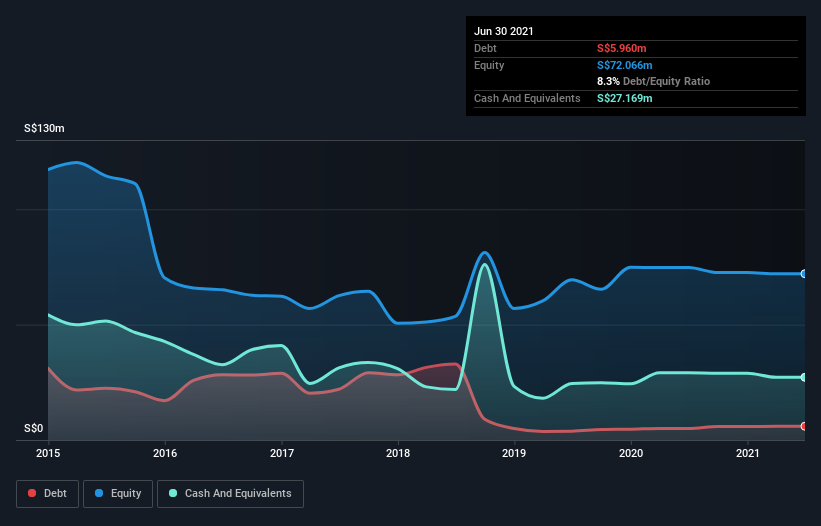
Some say volatility, rather than debt, is the best way to think about risk as an investor, but Warren Buffett famously said that 'Volatility is far from synonymous with risk.' It's only natural to consider a company's balance sheet when you examine how risky it is, since debt is often involved when a business collapses. As with many other companies ASTI Holdings Limited (SGX:575) makes use of debt. But the real question is whether this debt is making the company risky.
What Risk Does Debt Bring?
Debt and other liabilities become risky for a business when it cannot easily fulfill those obligations, either with free cash flow or by raising capital at an attractive price. Part and parcel of capitalism is the process of 'creative destruction' where failed businesses are mercilessly liquidated by their bankers. However, a more frequent (but still costly) occurrence is where a company must issue shares at bargain-basement prices, permanently diluting shareholders, just to shore up its balance sheet. Having said that, the most common situation is where a company manages its debt reasonably well - and to its own advantage. When we examine debt levels, we first consider both cash and debt levels, together.
See our latest analysis for ASTI Holdings
What Is ASTI Holdings's Net Debt?
The image below, which you can click on for greater detail, shows that at June 2021 ASTI Holdings had debt of S$5.96m, up from S$5.02m in one year. However, its balance sheet shows it holds S$27.2m in cash, so it actually has S$21.2m net cash.

How Healthy Is ASTI Holdings' Balance Sheet?
We can see from the most recent balance sheet that ASTI Holdings had liabilities of S$21.7m falling due within a year, and liabilities of S$4.37m due beyond that. Offsetting this, it had S$27.2m in cash and S$24.2m in receivables that were due within 12 months. So it actually has S$25.3m more liquid assets than total liabilities.
This luscious liquidity implies that ASTI Holdings' balance sheet is sturdy like a giant sequoia tree. With this in mind one could posit that its balance sheet means the company is able to handle some adversity. Simply put, the fact that ASTI Holdings has more cash than debt is arguably a good indication that it can manage its debt safely. There's no doubt that we learn most about debt from the balance sheet. But you can't view debt in total isolation; since ASTI Holdings will need earnings to service that debt. So when considering debt, it's definitely worth looking at the earnings trend. Click here for an interactive snapshot.
Over 12 months, ASTI Holdings made a loss at the EBIT level, and saw its revenue drop to S$56m, which is a fall of 4.6%. That's not what we would hope to see.
So How Risky Is ASTI Holdings?
Although ASTI Holdings had an earnings before interest and tax (EBIT) loss over the last twelve months, it made a statutory profit of S$1.9m. So taking that on face value, and considering the cash, we don't think its very risky in the near term. There's no doubt the next few years will be crucial to how the business matures. There's no doubt that we learn most about debt from the balance sheet. But ultimately, every company can contain risks that exist outside of the balance sheet. For example - ASTI Holdings has 2 warning signs we think you should be aware of.
When all is said and done, sometimes its easier to focus on companies that don't even need debt. Readers can access a list of growth stocks with zero net debt 100% free, right now.
New: Manage All Your Stock Portfolios in One Place
We've created the ultimate portfolio companion for stock investors, and it's free.
• Connect an unlimited number of Portfolios and see your total in one currency
• Be alerted to new Warning Signs or Risks via email or mobile
• Track the Fair Value of your stocks
This article by Simply Wall St is general in nature. We provide commentary based on historical data and analyst forecasts only using an unbiased methodology and our articles are not intended to be financial advice. It does not constitute a recommendation to buy or sell any stock, and does not take account of your objectives, or your financial situation. We aim to bring you long-term focused analysis driven by fundamental data. Note that our analysis may not factor in the latest price-sensitive company announcements or qualitative material. Simply Wall St has no position in any stocks mentioned.
Have feedback on this article? Concerned about the content? Get in touch with us directly. Alternatively, email editorial-team (at) simplywallst.com.
About SGX:575
ASTI Holdings
ASTI Holdings Limited, an investment holding company, engages in the provision of semiconductor manufacturing services for surface mount technology components in Singapore, China, Malaysia, the Philippines, the United Kingdom, and internationally.
Adequate balance sheet and slightly overvalued.
Similar Companies
Market Insights
Community Narratives




